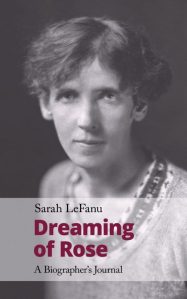Published by Handheld Press
Publication date - 6 July 2021
Source - review copy

In 2003 the former Women's Press editor and literary critic Sarah LeFanu published her acclaimed biography of Rose Macaulay with Virago Press.
As well as writing the biography, LeFanu was keeping a detailed journal of her research trips and her processes as a biographer, arguing with herself over what to include, what to pursue, and what to leave behind. In 2013 she self-published Dreaming of Rose, her memoir of juggling the demands of teaching and broadcasting while researching and writing Rose's biography. It's a feminist story, and a triumphant validation of the rewards of research.
This revised Handheld edition of Dreaming of Rose is an updated and revised edition of the original self-published edition of 2013.
Rose Macaulay's writing career spanned over 50 years. She wrote 23 novels in addition to essays, poetry and travel and history books, as well as many letters. She was friends with many literary names including Elizabeth Bowen, E M Forster and occasionally Virginia Woolf. Sarah LeFanu's biography of Rose Macaulay was published in 2003. In Dreaming of Rose the reader is able to look inside the diary of a biographer.
Now I will start out by saying I have never read any books by Rose Macaulay. That is not to say I have not heard of her. I have at least one book of hers on my to be read pile. I picked up Dreaming of Rose thinking it was a biography of her then as I read I realised it was in fact the diary of her biographer, Sarah LeFanu. This didn't stop me wanting to read it. In fact I thoroughly enjoyed the brief look into the lives of Sarah, Rose and the people who knew her.
I loved the diary format. Short insights into the days and weeks of research, of the struggle to find a starting point or particular reference. Details of research trips abroad, to follow in Rose's footsteps. This all made the book easy to read, the reader able to dip in and out of a particular time on Sarah LeFanu's journey as biographer.
There are many people referred to in the book. Whilst it has of course been edited and tweaked since written, it is after all a diary and so repeated visits to the same people don't always reference who they are in relation to Rose Macaulay. It was therefore sometimes difficult to remember who was who and why or how they could help in research into Rose's life. However, I soon decided to stop trying to remember who these people were and focus on what they were, or were not, saying about Rose.
Whilst I am not familiar with the works of the Rose Macaulay, I did find Dreaming of Rose a fascinating insight into the world of the biographer. Sarah LeFanu is open about her struggles to write the book, where to start, realising after much work it was indeed best to start at the beginning (i.e. Rose's birth). The reader sees Sarah's frustrations at missing pieces of the puzzle, at people's often understandable reticence at being interviewed. There was the worry she was treading old ground that previous biographers had walked before. There are notes on her lack of belief, that what she is writing simply isn't good enough. She is honest when it comes to finances, or lack thereof, wondering if she will be able to earn enough money to pay the bills and her joy when her work is recognised and appreciated.
There are details of Sarah LeFanu's other work undertaken during the time she wrote the biography. Writing radio plays and teaching writing courses are interspersed with research trips, sometimes to places Rose herself has visited, sometimes to libraries to spend days reading about her subject. All of this added an interesting dimension to the process of writing a biography.
Fans of Rose Macaulay will find this book fascinating, as no doubt will those interested in biographers. As for me, it has made me determined to read at least one of Rose Macaulay's 23 novels sooner rather than later.


No comments:
Post a Comment